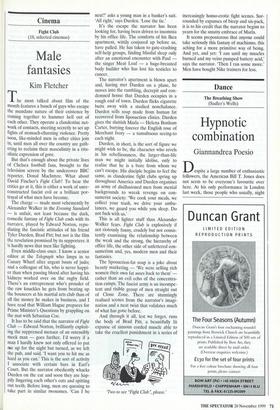Cinema
Fight Club (18, selected cinemas)
Male fantasies
Kim Fletcher The most talked about film of the month features a bunch of guys who escape the mundane nature of their existence by coming together to hammer hell out of each other. They operate a clandestine net- work of contacts, meeting secretly to set up fights of stomach-churning violence. Pretty soon, like-minded men in other cities join in, until men all over the country are gath- ering to reclaim their masculinity in a ritu- alistic expression of gore.
But that's enough about the private lives of Chelsea football fans, brought to the television screen by the undercover BBC reporter, Donal MacIntyre. What about David Fincher's Fight Club? To hear the critics go at it, this is either a work of unre- constructed fascist evil or a brilliant por- trayal of what men have become.
The charge — made most vehemently by Alexander Walker in the Evening Standard — is unfair, not least because the dark, comedic fantasy of Fight Club ends with its narrator, played by Edward Norton, repu- diating the fascistic attitudes of his friend Tyler Durden, Brad Pitt; but nor is the film the revelation promised by its supporters: it is hardly news that men like fighting.
Even middle-class ones. I know a senior editor at the Telegraph who limps in to Canary Wharf after urgent bouts of judo; and a colleague of his, who is never happi- er than when passing blood after having his kidneys worked over on the rugby field. There's an entrepreneur who's prouder of the raw knuckles he gets from beating up the bouncers at his martial arts club than of all the money he makes in business, and I have read that William Hague prepares for Prime Minister's Questions by grappling on the mat with Sebastian Coe.
It has to be said that the narrator of Fight Club — Edward Norton, brilliantly exploit- ing the suppressed menace of an ostensibly meek man — goes further. I'd worry if a man I hardly knew not only offered to put me up for the night but turned, as we left the pub, and said, 'I want you to hit me as hard as you can.' This is the sort of activity I associate with certain bars in Earl's Court. But the narrator obediently whacks Durden on the ear and soon they are hap- pily fingering each other's cuts and spitting out teeth. Before long, men are queuing to take part in similar twosomes. 'Can I be next?' asks a young man in a banker's suit. 'All right,' says Durden. 'Lose the tie.'
It's the escape the narrator has been looking for, having been driven to insomnia by his office life. The comforts of his Ikea apartment, wittily conjured up before us, have palled. He has taken to gate-crashing self-help groups, finding blissful sleep only after an emotional encounter with Paul the singer Meat Loaf — a huge-breasted body builder who has lost his testicles to cancer.
The narrator's apartment is blown apart and, having met Durden on a plane, he moves into the rambling, decrepit and con- demned house that Durden occupies in a rough end of town. Durden flicks cigarette butts away with a studied nonchalance.
Durden sells soap made from human fat recovered from liposuction clinics. Durden gives the sluttish Marla — Helena Bonham Carter, burying forever the English rose of Merchant Ivory — a tumultuous seeing-to each night.
Durden, in short, is the sort of figure we might wish to be, the character who revels in his rebelliousness, the larger-than-life man we might initially idolise, only to realise that he is a bore from whom we can't escape. His disciple begins to feel the same, as clandestine fight clubs spring up throughout America and Durden organises an army of disillusioned men from menial backgrounds to wreak revenge on con- sumerist society: 'We cook your meals, we collect your trash, we drive your ambu lances, we guard you while you sleep. Do not fuck with us.'
This is all lighter stuff than Alexander Walker fears. Fight Club is explosively if not riotously funny, crudely but not consis- tently examining the relationship between the weak and the strong, the hierarchy of office life, the other side of unfettered con- sumerism and, yes, modern men and their fantasies.
The liposuction-fat soap is a joke about beauty marketing — 'We were selling rich women their own fat asses back to them' - rather than an evil echo of the concentra- tion camps. The fascist army is an incompe- tent and risible group of men straight out of Clone Zone. There are stunningly realised scenes from the narrator's imagi- nation and a neat twist that validates much of what has gone before.
And through it all, lest we forget, runs the body of Brad Pitt, a beautifully lit expanse of sinuous corded muscle able to take the cruellest punishment in a series of 'Two to see "Fight Club", please.' increasingly homo-erotic fight scenes. Sur- rounded by expanses of bicep and six-pack, it is to his credit that the narrator begins to yearn for the smutty embrace of Marla.
It seems preposterous that anyone could take seriously this fantasy of machismo, this aching for a more primitive way of being. And yet, and yet: 'I ran until my muscles burned and my veins pumped battery acid,' says the narrator. 'Then I ran some more.' Men have bought Nike trainers for less.


























































































 Previous page
Previous page